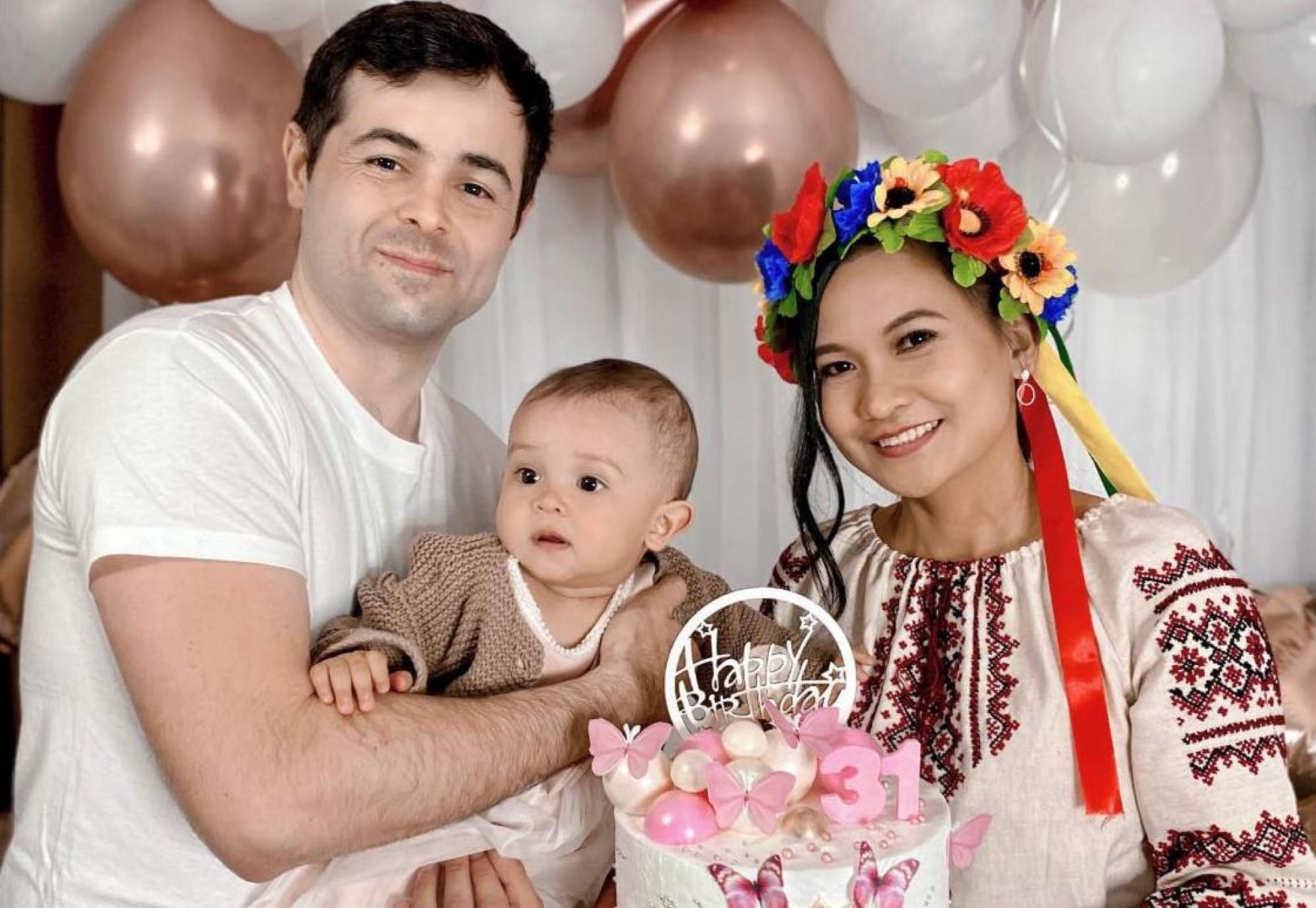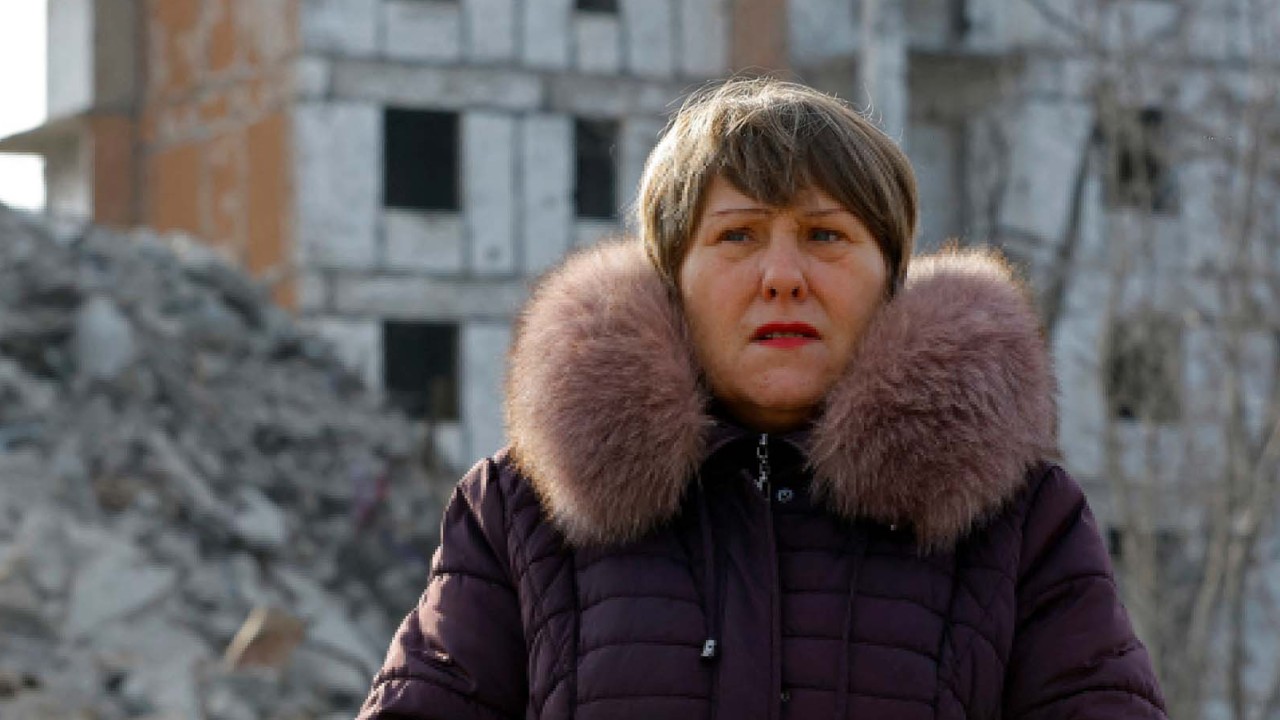
Philippine mum in Ukraine tries to give baby ‘normal life’ even as war rages on
- Rhea Taibova moved with her Ukrainian husband and daughter to her in-laws’ home after Russia invaded, learning later that a mall and preschool near their Kyiv home were hit
- Despite high prices of food and baby milk formula, frequent power outages and daily air raid sirens, she tries to give her daughter a semblance of normality
The dark-eyed toddler peeks out from under her pink bobble hat. Framed against bare trees and a two-storey house in central Ukraine, she stands alone on a snow-covered road.
The tranquillity of this photo is in sharp contrast to the graphic images that have come out of the country. Lia was just a baby when Russia invaded Ukraine in February last year and she still has no idea that her Filipino-Ukrainian parents had to move from the capital Kyiv – where she was born – to a small village in search of safety.

While tens of thousands of people fled their homes, Taibova’s husband sped to the capital to pack their belongings into a truck. “We were not able to carry everything [because] we were super rushed,” she said. Later on, “a preschool five minutes away from us was hit ... and a big mall nearby was destroyed. I am just glad we weren’t there”.
They transported their belongings to the house of Taibova’s in-laws – the exact location cannot be revealed due to safety reasons.
“The first 10 days of war were really hard. I was feeling depressed and anxious,” she said. “I kept crying, but then my baby would look at me and smile. Without her, I couldn’t cope with this.”
Indonesian women stand by their Ukrainian husbands despite constant Russian attacks
She could not bear the idea of abandoning her in-laws and her husband, who fell under the ban that forbids men aged between 18 and 60 from leaving the country.
Taibova’s daughter was also too young and did not have travel documents. “It was too risky for us to travel overland to the border … So many civilians have died,” she said.
Taibova met her Ukrainian husband on a cruise ship while both were working as entertainers. They married in 2019 and she moved to Kyiv the following year.
“I really love Ukraine. In terms of living standards, I prefer to live here than in the Philippines or anywhere else,” she said. “It was a beautiful and peaceful country before this war happened.”

Minorities fleeing Ukraine reported discrimination and racism, but Taibova said she had not faced such negative experiences.
The language barrier has been the main challenge. “I have learned a bit of Ukrainian and people here are quite friendly,” she said.
For Taibova, the beginning of the war was brutal in other ways.
“Some stores had many empty shelves and the prices doubled or tripled,” she said. Taibova recalled crying over the lack of baby milk formula at one point.
Today, with some prices still higher than before the war, she is grateful for a small nearby farm where they grow vegetables. For instance, she remembers buying 1kg of rice for 26 Ukrainian hryvnia (US$0.70) before the war but now spends up to 55 hryvnia.
Pregnant Russian women flock to Argentina seeking safety, passports
Taibova’s family has got used to power shortages – sometimes they go without electricity for 12 hours – and they have also lost count of the sleepless nights.
“It’s a nightmare. The [air raid] sirens are very loud. Not a single day goes by without the sound of a siren,” Taibova said, adding they often hide in a basement.
Their village has mostly been spared from explosions and casualties. But “we feel nervous and scared because you don’t know what might happen next”, she said.
In December, Taibova shared a video from a year earlier of her husband dancing while Lia was crawling on the floor. “I miss our house [in] Kiyv”, Taibova wrote.
Before the war, she was an active vlogger showcasing tourist spots in the capital and sharing snippets of her family life.
As the conflict unfolded, Taibova continued posting uplifting images on her social media accounts and YouTube to show that people are also leading “normal lives” despite the violence raging throughout the country.
“I want to show my family [in the Philippines] and friends that we are OK, so they will not worry too much about us,” she said. “Especially my parents, they are always checking my profile.”
Taibova previously collected donations for Ukrainian evacuees and those who joined the military. Her husband has tried to make ends meet by finding work online.
Cheap, fast, good: South Korean weapons in high demand from Malaysia to Poland
Taibova, a temporary visa holder, travelled recently to the Philippines where she is requesting documents that are needed for her permanent residency application in Ukraine. She plans to rejoin her daughter and husband this month.
But questions hang over the family’s future.
“It all depends on when the war will be over,” Taibova said. “I would prefer to stay and live in Ukraine as long as there is no war.”
Once or twice a week, Taibova takes Lia to a small park five minutes away from her in-laws’ house, so her daughter can experience a semblance of normality.
But the fear, she said, is always there.
Taibova hopes that her daughter will not have any trauma from the war. “I am grateful that she is small. Hopefully, it will be just a story that I will tell her.”


